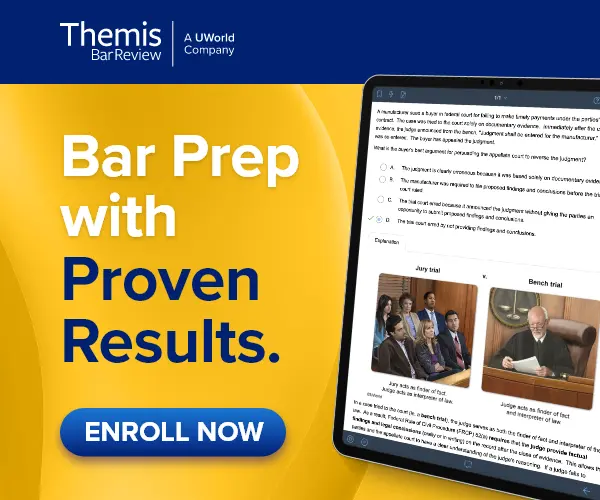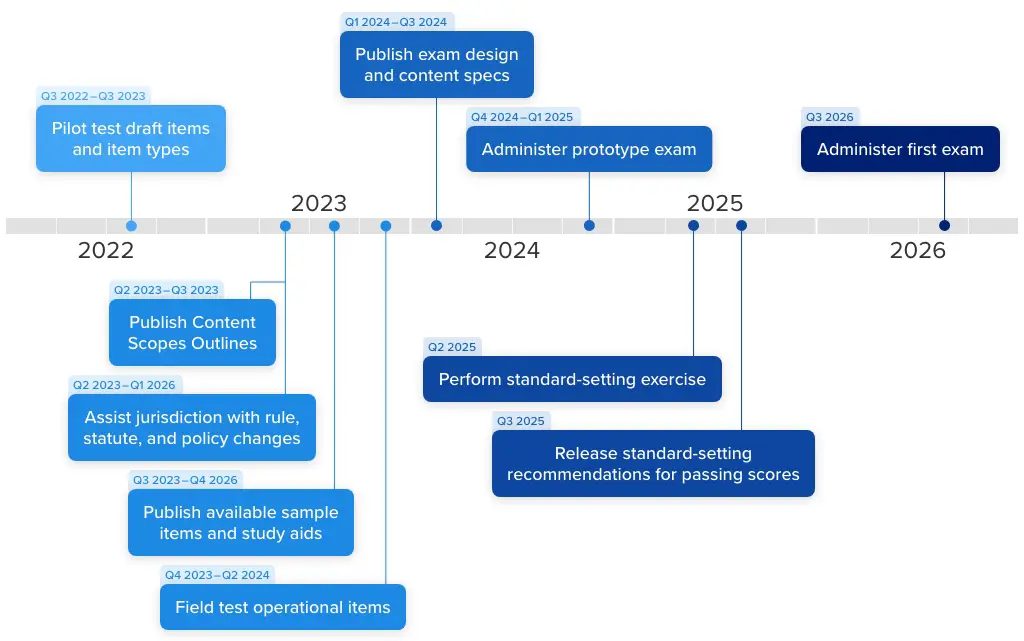A Brief History of the Bar Exam
A young man embarks on his legal studies by borrowing books from a local attorney. He reads voraciously and, in time, learns the law. Needing permission to practice, he obtains a certificate of moral character from a local court, and the state Supreme Court justices conduct an interview to assess his character and basic legal knowledge.
This man never went to law school and never took a written legal exam. Yet, he would become one of the most respected lawyers in Illinois’ history before venturing into politics. Abraham Lincoln never had to worry about studying the fine print of bar exam requirements or scouring Reddit for opinions on the best bar prep, but you do. Here’s why.
The Origins of Legal Examination
The bar exam is a relatively modern innovation in the longstanding tradition of marking a clear boundary between the general public and those authorized to practice law. The origins of the bar exam in the anglosphere are rooted in the medieval era when senior legal professionals assessed aspiring lawyers through oral examination and apprenticeship.
Such traditions persisted in the United States until the transition to more formal written exams in the late 19th to early 20th centuries—a shift reflecting the growing complexity of law and the emerging necessity for a standardized method to comprehensively assess legal knowledge and skills.
The Development of The Written Bar Exam in the US
In 1783, the Delaware Colony held the first bar exam in the US. The practice of oral examination following apprenticeship with a practicing judge or attorney—called “reading the law”—was common through the 18th and 19th centuries.
The 19th century saw an increasing number of law schools being established, which actually led to fewer bar exams in favor of admitting students to the bar upon graduation (diploma privilege). By the late 19th century, written exams became commonplace to test the increasing number of lawyers practicing across state lines.
The American Bar Association (ABA) was established in 1878 with the goal of organizing a national code of ethics in the legal profession and serving as a forum for discussing the increasingly complex issues of legal practice. In 1921, the ABA declared favor for written exams over diploma privilege, and by 1980, 45 of 50 states had mandated written bar exams.
The Formation of Uniform Bar Exam (UBE®)
Recognizing the need for a national organization to standardize the exam process for bad admission, a group of legal professionals formed The National Conference of Bar Examiners (NCBE®) in 1931.
In 1972, the NCBE administered the first Multistate Bar Exam (MBE®)—a standardized multiple-choice exam that assesses an examinee's ability to apply fundamental legal principles and reasoning to analyze fact patterns. Today, every US jurisdiction administers the MBE except Puerto Rico and Louisiana.
The NCBE continued working toward standardization, and in 2011, administered the first Uniform Bar Exam (UBE®) in Missouri and North Dakota. The UBE added 2 written components to the MBE: the Multistate Performance Test (MPT®) and the Multistate Essay Exam (MEE®). These 3 components are administered as the UBE by most jurisdictions today.
The UBE Today
If you enjoy cheese and cold weather, you can attend law school in Wisconsin and get admitted to the state bar upon graduation. Oregon has also recently rolled out an alternative pathway to legal practice. However, nearly all jurisdictions now require candidates to pass a bar exam, and most administer the UBE.
Every UBE jurisdiction administers the UBE on the final Tuesday and Wednesday of February and July—the MBE on Tuesday and the written portion on Wednesday. Candidates who pass the UBE benefit from score portability among participating jurisdictions. To learn more about the UBE or your jurisdiction’s bar exam, see these resources:
The NextGen Bar Exam
In January 2019, the NCBE established a “Testing Task Force” to undertake a comprehensive study of the bar exam to ensure that it continues to test the knowledge, skills, and abilities most relevant to entry-level legal practice in a fair, valid, and reliable manner.
This research culminated in the publication of their final report in April 2021. The report outlined the task force’s findings and offered recommendations for the future of the bar exam, including developing a next generation bar exam (NextGen Bar Exam).
Some jurisdictions have committed to debuting the NextGen Bar Exam in July 2026, while others are waiting until 2027 or 2028. The NCBE’s stated purpose is to align the exam more closely with the practical skills and knowledge required for modern-day legal practice while maintaining high standards for licensure.
The NextGen Bar Exam will test 7 “Foundational Skills”, organized into 4 broad skills areas, alongside the original MBE subjects (plus business associations; family law will be added in 2028). Question types will include multiple-choice, integrated question sets, and performance tasks.




